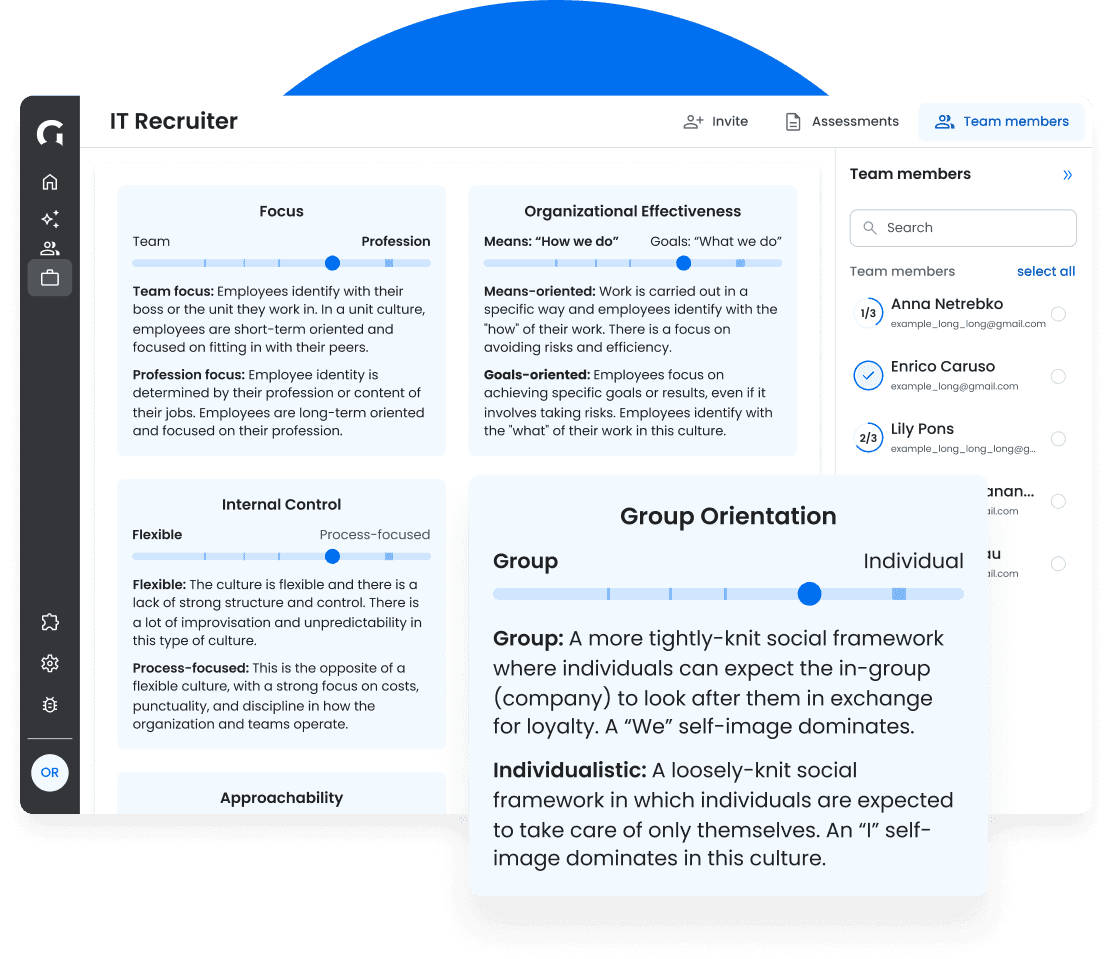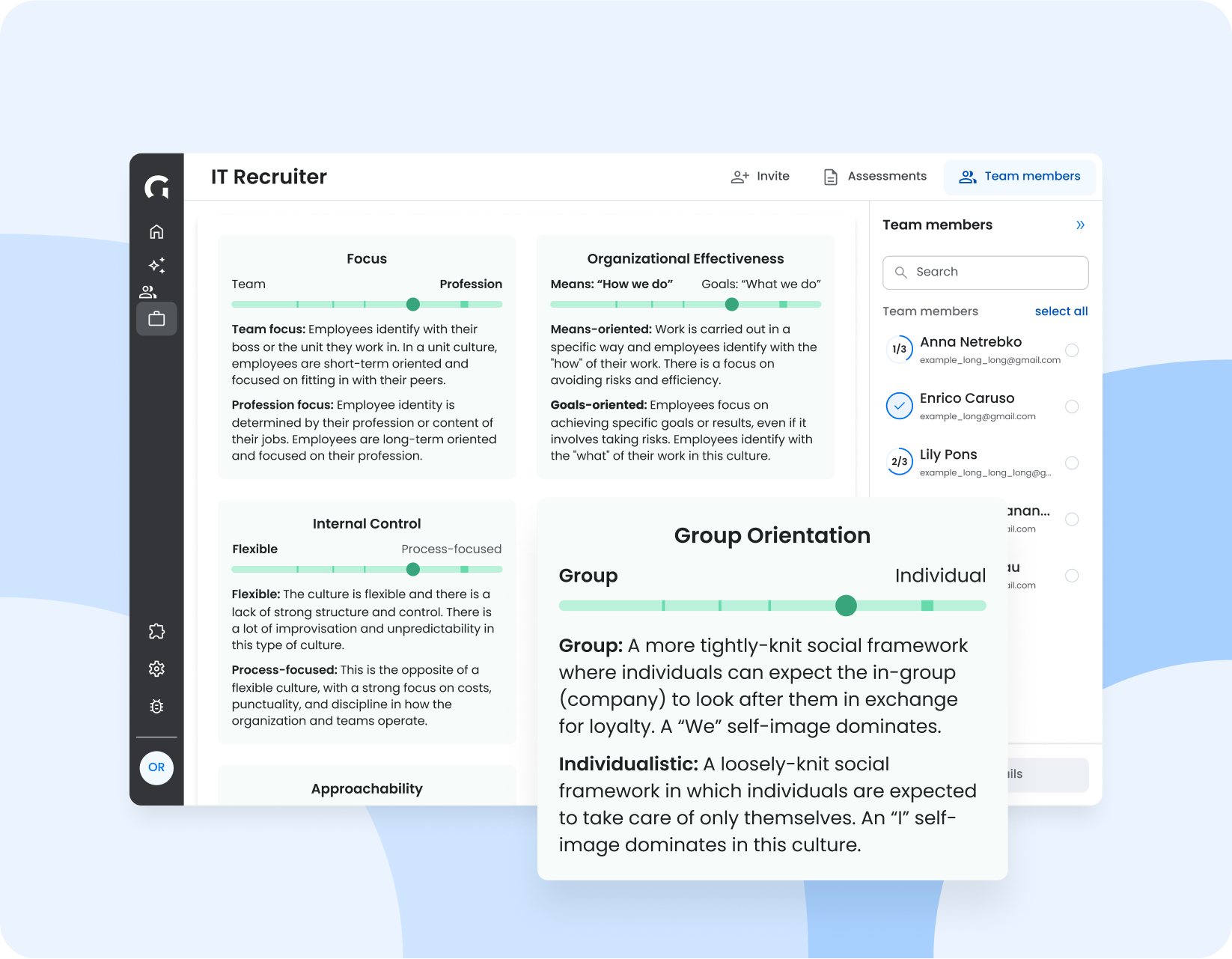Culture Canvas by Gyfted
Assess Values & Culture Fit using Culture Assessment Tools
Use cultural, values and behavioral assessments to develop talent, and select candidates that fit your organization. Improve team performance by benchmarking your top performers and culture leaders using cultural assessments.

Culture Assessment Tools for teams and individuals
Create your Culture Canvas by comparing assessed individuals against your teams and leaders. Benchmark culture and values by assessing your high performers and leaders.
Your culture is who you hire, fire and promote
Alignment around values supports performance
Diversity stems from variety in characters and styles
Trusted by innovative brands worldwide
Organizational Culture Assessment Instrument by Gyfted

Team values
Knowing the values of your leaders and employees helps build self-awareness and alignment. Your team’s values, personalities and behaviors ultimately determine your culture.
Culture type
Understanding your team culture will help you promote better collaboration and alignment, leading to a more resilient and effective work environment.
Your Culture Assessment Canvas
Driving change requires an understanding of individual and team values and character traits. Leaders that focus on culture succeed more often in building resilient, collaborative and high performing teams.
Measure
personalities and preferences to drive performance.
Understand
what drives your people, high performers and leaders.
Maintain
privacy and anonymity for employees regarding their individual results
Benchmark
individuals and teams toward alignment and growth.
Easy to use tools to develop your organizational culture
Discover your team in one click. Use one link to invite your team to take an assessment that will enlighten you on what your team is like, help each of your team's members understand themselves better, and spearhead your company's culture growth process. No set up. Easy onboarding.
Transform your organization
Diagnose your organizational culture team by team, unit by unit, and initiative by initiative - all across the board without worrying about the costs of each assessment. Benchmark your leaders and high performers to figure out who to add to your team from a culture add or culture fit perspective. Gain insightful data that will aid your talent development, coaching, promotion, succession and high performance initiatives.
Identify the dominant values and cultural dimensions. Discover gaps between your declared, actual and desired culture. Evaluate what values align your people together, and act on any misalignment. Gyfted’s culture assessment is inspired by Hofstede's cultural dimensions theory, and our values assessment is inspired by Schwartz’s Personal Values methodology.
Discover your team culture
Maximize your team's potential by leveraging Hofstede-inspired cultural dimensions
Organizational effectiveness describes a focus on means-oriented (""how"") or goals-oriented (""what"") methods of operating.
Customer orientation describes the drive towards internal vs external customer orientation.
Control level describes the level of control ie. easy-going vs process-focused organization.
Collectivism describes the drive towards team-oriented or competition-oriented work approaches.
Approachability describes a relatively more open or closed culture style.
Management philosophy philosophy describes the drive towards a people-oriented or targets-oriented culture.
Use Gyfted’s workplace culture survey to drive team performance
We believe personality, behavioral, and culture assessments are underutilized in talent management. Whether for talent development, internal mobility, or talent acquisition, the typical legacy test provider prices you per test or per candidate - and this restricts the value and organizational impact of these tools and, above all, your work. We're changing this by offering unlimited access to assessments to people, talent and culture professionals.
Improve collaboration and self-awareness
Culture is crucial for startups and enterprises, as it shapes the work environment, drives engagement and influences success. For startups, a strong culture can attract top talent and foster innovation, while enterprises benefit from maintaining alignment and cohesion across larger teams. By utilizing behavioral assessments powered by Gyfted’s knowledge graphs, companies can gain deep insights into their team's dynamics, identify strengths and areas for growth, and tailor development plans that enhance cultural fit and collaboration.
Our Experts
1. Blaze Mrozinski, CPO - SWPS, London School of Economics
2. Alina Shabatov, Sr Psychometrician - Bar-Ilan, Cambridge
Frequently asked questions
How to screen applicants effectively?
Effective candidate screening should be done at the top of your hiring funnel, namely at the moment of application. The problem with doing this is that almost all test providers charge you per test. At Gyfted we do not, in order to enable you to screen applicants upfront for desirable traits and culture fit, as well as abilities. Effective screening should also be done in ways that measure what matters for the job and organizational fit: personality assessments, motivational tests, cognitive ability tests, cultural assessments, team culture tests, hiring manager preference assessments, detailed job specifications, skills tests all should - in an ideal scenario - be done by every applicant. The huge second problem with this nowadays is that candidates are required to go through assessments for each single application. This prolongs the recruitment process, creates a tough candidate experience, and takes candidates on never-ending recruitment marathons (followed by numerous unstructured, biased interview marathons) that are a time sink for them and for you. This is an enormous time, financial and resource burden for all organizations. Turnover on top of this amplifies these costs, which is a big problem with business-process outsourcing and services outsourcing via BPOs and SSCs for example. Recruiting is the most inefficient, resource-wasting endeavor in organizations today and it must change. This is what we're up to at Gyfted, and screening applicants effectively takes place using our state of the art psychometrics, machine learning, workflow automation, ease of use in a single solution so you can save time while gaining insights into pre-vetted applicants all across the board.
How to hire for startup culture fit?
Tech companies and startups face very dynamic competition for talent and market dynamics. Hiring for culture fit first is a great strategy to help you develop the glue that will lower turnover and improve performance, satisfaction and motivation in your team to power through the tough days and challenges that never end. You have to know what sort of culture fits you and your team and product. To learn more about how to become a culture-first organization and why culture fit matters, check out our article on this topic "What is culture fit"
.Why is hiring for culture fit important?
Team culture matters because it is the glue that binds people together outside of making money. Everyone's got differing motivations, values and preferences that determine how they behave, communicate and cooperate. "Culture eats strategy for breakfast", because it is the glue that makes groups cooperate and gives them stamina. This matters especially in startups. It is the founder's and manager's role to define culture through actions, which can be contributing or detrimental to building high-performance teams. Research shows that culture is a key determinant of team performance, and building culture begins with who you hire and fire, how you manage them, and your actions which speak louder than words.
How are Gyfted’s assessments validated?
At it's core our assessments stem from organizational psychology research. We build our tools based on theory and check their performance using various methods. We run planned experiments on closed samples to check for social desirability in our item banks. We test - retest our users in order to evaluate stability and reliability of measured traits. Using classical test theory methods (for example: EFA and CFA) we verify the internal structure of our assessments and scales and make sure they are invariant across multiple samples and sources. Finally, once enough information is gathered we reevaluate these assessments using IRT based methods and replace their static formats to computer adaptive testing (CAT).
Are the tests getting better over time?
Our tests are normalized and we’re continuously growing our item banks, as well as testing our tests across populations and job types. Our assessments are continuously developed towards better computer adaptive testing (CAT).
Why should I use personality or ability testing?
Personality tests help you easily find candidates that fit your role and your own needs (culture fit) in your applicant pool, thereby helping you make data-driven selection decisions and cut down on the number of screening interviews. Personality and ability tests are the best and most objective predictors of success in life and at work. We all self-select into occupations and strive to change careers depending on our preferences and personality traits - certain jobs require certain personality traits eg. empathy is extremely important in nursing, risk-aversion and detail orientation in accounting, and so forth. Research shows there’s no better, more objective tool for evaluating work potential than cognitive ability tests. It also makes comparisons between candidates far easier.